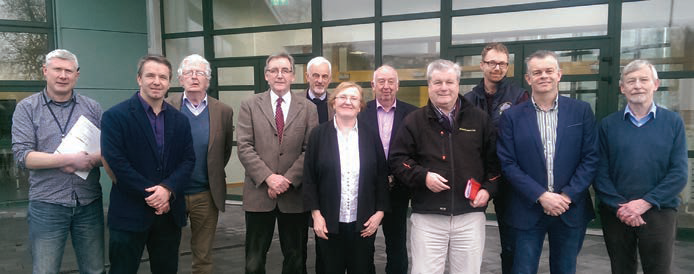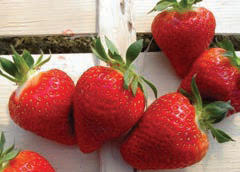

RHI-RENEWABLE HEAT INCENTIVE AND HORTICULTURE?
As part of Ireland’s strategy to meet its obligations under the 2009 Renewable Energy Directive, the government has targeted the delivery of 12% of final heating demand from renewable sources by 2020, a target which is unlikely to be met. A public consultation period on the design and implementation of a renewable heat incentive (RHI) in Ireland was launched in late January.
Teagasc Horticulture Development Department has been facilitating impacted horticulture sub-sectors to understand how the future shape of a scheme might impact their sector.
Recent meetings and consultations with the mushroom sector and the protected crops sector have resulted in detailed submissions around the grandfathering clause, boiler sizing, energy efficiency criteria and fuel standards to be made.
The RHI in effect means that generators of renewable heat for non-domestic buildings can be paid per kWhr for hot water and heat which they generate and use themselves. The RHI
tariff will depend on which renewable heat systems are used and the scale of generation. The annual subsidy which has not been set yet is proposed to last for 15 years. As such, users may be incentivised to spend money on changing to a renewable heat source and earn enough money from the tariffs to pay off their installation over a reasonable period of time.✽
|
|
| THE LARGE,BRIGHT RED, VERY FIRM AND CONICAL SHAPE OF ‘CLERY’ STRAWBERRIES |
FOOD SAFETYThe FSAI has published new guidance to assist growers with the safe production of fresh produce (i.e. fruit, vegetables, mushrooms, herbs etc) on farms. The guidance outlines the potential risks associated with fresh produce and provides practical advice to growers to reduce these risks and improve food safety. The guidance was developed in conjunction with growers, processors, retailers as well as representatives of the Department of Agriculture, Food and the Marine (DAFM), Teagasc, Bord Bia, the EPA and the IFA.The new guidance document and its accompanying simplified leaflet can be found at www.fsai.ie. Those producing fresh produce for sale must be registered as a grower with the DAFM in accordance with Article 6 of Regulation (EC) No 852 of 2004 on food hygiene. |
ALTERNATIVE CROPS FOR CUT FOLIAGE SECTOR

Teagasc researcher Helen Grogan was recently awarded funding of €0.5m by DAFM for innovative research to support the cut foliage and nursery stock sectors over four years. The project is entitled ‘New Leaves – alternative crops for the cut foliage sector’ and will identify novel foliage plant lines in response to growing demand for high-quality products from export and home markets. Various propagation technologies will be explored to produce interesting lines of Eucalyptus spp, Pittosporum, Viburnum spp, Pittosporum spp, Ozothamnus spp, and Brachyglottis spp. On completion of the project, stocks of elite ‘mother plants’ will be available for propagation under licence by cut foliage growers or specialist plant nurseries. Practical advice will be available to help growers deal responsibly with pest and disease problems that reduce their profitability.
To support this research, a contract horticultural technician post (ref CT/ASH/0217) and a post-doctoral research Fellow level 1- horticultural biotechnology post (ref PD1/ASH/0217)
are advertised on the Teagasc website at www.teagasc.ie/careers and www.teagasc.ie/about/opportunities/post-doctoral-opportunities. ✽
CRYPHONECTRIA PARASITICA AND PLANT PASSPORTSIt has come to light recently that currently no Dutch nurseries and traders are authorized by the Dutch National Plant Protection Organisation (NPPO) to move Castanea sativa plants into protected zones. Ireland has a protected zone for Cryphonectria parasitica which means that C. sativa plants moved into Ireland |
 |
THE AGRICULTURE CASHFLOW SUPPORT LOAN SCHEME (SBCI)
The scheme was developed in co-operation with the Strategic Banking Corporation of Ireland (SBCI), which confirmed that AIB, Bank of Ireland and Ulster Bank will distribute the loans, making €150m available to farmers and horticultural producers throughout Ireland at a low-cost interest rate of 2.95%. This is supported by €25m being provided by the DAFM, including €11m in EU exceptional adjustment aid. It should be maximised by the horticulture sector, particularly those sectors most affected by Brexit.
Loan features
● Loans of up to a maximum of €150,000
● Loan term of up to six years
● Loans are unsecured
● Optional interest only repayments available at the start of the loan
● Interest rate of 2.95% for the term of the loan
Loans can be used for
● Working capital requirements
● A more sustainable alternative to short-term credit facilities
● An alternative to merchant credit ✽








